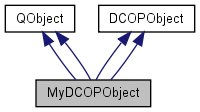dcop
MyDCOPObject Class Reference
#include <dcop_deadlock_test.h>

Public Slots | |
| QCStringList | functions () |
| void | registered (const QCString &appName) |
| void | slotTimeout () |
| void | slotTimeout () |
| void | slotTimeout2 () |
| void | unregistered (const QCString &appName) |
Public Member Functions | |
| void | function (const QString &arg1, int arg2) |
| MyDCOPObject (const QCString &name) | |
| MyDCOPObject (const QCString &name, const QCString &remoteName) | |
| bool | process (const QCString &fun, const QByteArray &data, QCString &replyType, QByteArray &replyData) |
| bool | process (const QCString &fun, const QByteArray &data, QCString &replyType, QByteArray &replyData) |
Detailed Description
Definition at line 37 of file dcop_deadlock_test.h.
Constructor & Destructor Documentation
Definition at line 33 of file dcop_deadlock_test.cpp.
| MyDCOPObject::MyDCOPObject | ( | const QCString & | name | ) | [inline] |
Definition at line 63 of file testdcop.h.
Member Function Documentation
| void MyDCOPObject::function | ( | const QString & | arg1, | |
| int | arg2 | |||
| ) | [inline] |
Definition at line 66 of file testdcop.h.
| QCStringList MyDCOPObject::functions | ( | ) | [virtual, slot] |
Returns the list of functions understood by the object.
It gets reimplemented by the IDL compiler. If you don't use the IDL compiler, consider implementing this function manually if you want your object to be easily scriptable.
Rationale: functions() allows an interpreter to do client-side type-casting properly.
Note to implementators: remember to call the baseclasses implementation.
- Returns:
- a list of functions
Reimplemented from DCOPObject.
Definition at line 139 of file testdcop.cpp.
| bool MyDCOPObject::process | ( | const QCString & | fun, | |
| const QByteArray & | data, | |||
| QCString & | replyType, | |||
| QByteArray & | replyData | |||
| ) | [virtual] |
Dispatches a message.
Usually you want to use an IDL compiler to automatically generate an implementation for this function.
If this function returns false, then processDynamic() is called.
Note to implementators: remember to call the baseclasses implementation. It handles the functions "functions()" and "interfaces()" which return the lists of supported functions and interfaces, respectively.
- Parameters:
-
fun is the normalized function signature. Such a signature usually looks like foobar(QString,int). The return type, qualifiers like "const" etc. are not part of the signature. data the received data replyType write the reply type in this string replyData write the reply data in this array
- Returns:
- true if successful, false otherwise. The default implementation returns false for all
funexcept "functions()" and "interfaces()".
Reimplemented from DCOPObject.
| bool MyDCOPObject::process | ( | const QCString & | fun, | |
| const QByteArray & | data, | |||
| QCString & | replyType, | |||
| QByteArray & | replyData | |||
| ) | [virtual] |
Dispatches a message.
Usually you want to use an IDL compiler to automatically generate an implementation for this function.
If this function returns false, then processDynamic() is called.
Note to implementators: remember to call the baseclasses implementation. It handles the functions "functions()" and "interfaces()" which return the lists of supported functions and interfaces, respectively.
- Parameters:
-
fun is the normalized function signature. Such a signature usually looks like foobar(QString,int). The return type, qualifiers like "const" etc. are not part of the signature. data the received data replyType write the reply type in this string replyData write the reply data in this array
- Returns:
- true if successful, false otherwise. The default implementation returns false for all
funexcept "functions()" and "interfaces()".
Reimplemented from DCOPObject.
Definition at line 39 of file dcop_deadlock_test.cpp.
| void MyDCOPObject::registered | ( | const QCString & | appName | ) | [inline, slot] |
Definition at line 70 of file testdcop.h.
| void MyDCOPObject::slotTimeout | ( | ) | [slot] |
| void MyDCOPObject::slotTimeout | ( | ) | [slot] |
Definition at line 59 of file dcop_deadlock_test.cpp.
| void MyDCOPObject::slotTimeout2 | ( | ) | [slot] |
Definition at line 120 of file testdcop.cpp.
| void MyDCOPObject::unregistered | ( | const QCString & | appName | ) | [inline, slot] |
Definition at line 73 of file testdcop.h.
The documentation for this class was generated from the following files:
 KDE 3.5 API Reference
KDE 3.5 API Reference